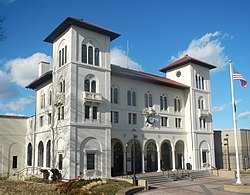New York, Westchester and Boston Railroad Administration Building
|
New York, Westchester and Boston Railroad Administration Building
|
|
|
NYC Landmark #LP-0839
|
|

The former NY&B Administration buildings that serves as the entrance to the East 180th Street IRT White Plains Road Line station.
|
|
| Location | 481 Morris Park Avenue, Bronx, New York |
|---|---|
| Coordinates | 40°50′29″N 73°52′23″W / 40.84139°N 73.87306°WCoordinates: 40°50′29″N 73°52′23″W / 40.84139°N 73.87306°W |
| Area | less than one acre |
| Built | 1912 |
| Architect | Fellheimer & Long; Stem, Allen H. |
| Architectural style | Late 19th and 20th Century Revivals, Italian Renaissance |
| NRHP Reference # | 80002587 |
| NYCL # | LP-0839 |
| Significant dates | |
| Added to NRHP | April 23, 1980 |
| Designated NYCL | May 11, 1976 |
The New York, Westchester and Boston Railroad Administration Building is a historic office building and railroad station in the Van Nest section of The Bronx, New York, New York. It was built in 1912 by the New York, Westchester and Boston Railway of concrete and has a three-story central section flanked by four-story projecting end pavilions. It has a street level loggia, and is the entrance to the East 180th Street Station.
It was designated a New York City Landmark in 1976 and was listed on the National Register of Historic Places in 1980. It is the only free-standing National Register building that serves as the entrance to a New York City subway station.
The offices on the building's upper floors house employees in the New York Transit Authority's rapid transit operations, signals and structures divisions.
The original architect of the building was Alfred T. Fellheimer, who also worked on the Grand Central Terminal. Fellheimer designed it to resemble an Italian villa.
The New York City Transit Authority budgeted $66.6 million for renovation of the structure in 2012. The renovation project was a collective effort, led by Lee Harris Pomeroy Architects in association with Weidlinger Associates. Luisa Caldwell was commissioned to provide new artwork.
As part of the project, a "dank passageway between the administration building and the passenger platforms" was converted "into an inviting, light-filled corridor."
The renovation also restored a clock beneath the figure of Mercury on the building's facade. The clock wasn't in the renovation budget, but the president of Citnalta Construction Corporation, general contractor for the project, didn't like the facade's appearance without a clock. Citnalta located a 45-inch diameter clock with Roman numerals and covered its $8,000 price and labor to install it as an extra contribution to the renovation project.
...
Wikipedia



